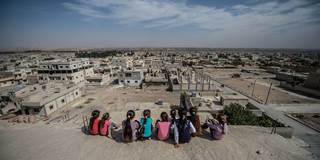OnPoint Subscriber Exclusive
Longer Reads provide in-depth analysis of the ideas and forces shaping politics, economics, international affairs, and more.

Syria’s Shattered Mosaic
Thanks to support from Russia and Iran, Bashar al-Assad’s regime no longer faces collapse – and thanks to support from Saudi Arabia and other Gulf states, Assad’s various opponents continue to hold large swaths of territory. When will the war end, and how will the outcome shape the regional and global politics?
At some point, Syria’s civil war – now in its sixth year – will end. But how? As Abba Eban, Israel’s foreign minister during the Arab-Israeli wars of 1967 and 1973, once said: “History teaches us that men and nations behave wisely once they have exhausted all other alternatives.”